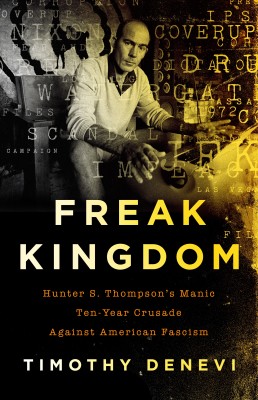Once again, it came on like a bad acid trip, the certainty that this couldn’t possibly be real, this pathetic excuse for a national life we’ve been asked to endure. There he was, fat-kid-who-ate-the-whole-pie smug smile welded in place, William Barr in all his bland, doughy menace, summoning the brisk, I’ve-got-a-tee-time-at-noon efficiency of the arrogant corporate lawyer. He couldn’t really be pulling a sick stunt like this? He wasn’t actually going to try more of his bullshit spin before the Mueller Report finally came out on April 18, and included lines like this, from Donald Trump, accurately sizing up the impact of having Bob Mueller on his ass: “Oh my God. This is terrible. This is the end of my Presidency. I’m fucked.” If only, if only, we could turn to certain brilliant American voices that have been silenced to help keep us sane amid so much insanity. Molly Ivins comes to mind. Mark Twain would no doubt have come up with some strong medicine against the Trump sickness. What of Hunter S. Thompson, that brilliant enigma, so sharp so often? He’d have been in his element burrowing into the fetid recesses of depravity that make up the world of Trump. He’d have been particularly good at skewering the likes of Lindsey Graham, who talked openly of his contempt for Trump before he was elected, only to put on a virtual one-man Broadway show of tap-dancing, contortionist tricks and singing a fake-as-a-two-dollar bill tune about the glorious leader. Oh how we could use Thompson’s voice now, in his early, menacing, loaded-for-boar political-writing mode.
California-born writer Timothy Denevi, author of Hyper: A Personal History of ADHD, has published a new Thompson book that focuses on  his work as a political writer and thinker, Freak Kingdom: Hunter S. Thompson’s Manic Ten-Year Crusade Against American Fascism. It’s a great read, soaring at all the right times, blunt and direct when it needs to be, that can be read and enjoyed by anyone, whether a student of the HST oeuvre or not, whether a fan of the cartoon character Gonzo image or someone who finds that image off-putting or worse. The better question is: Whatever you think of HST, or think you think of him, are you interested in the crusade against American fascism, a crusade never more important than right now? If so, you’ll come away from this book deeply grateful to Denevi – and, most likely, to Thompson himself, for all his abundant flaws.
his work as a political writer and thinker, Freak Kingdom: Hunter S. Thompson’s Manic Ten-Year Crusade Against American Fascism. It’s a great read, soaring at all the right times, blunt and direct when it needs to be, that can be read and enjoyed by anyone, whether a student of the HST oeuvre or not, whether a fan of the cartoon character Gonzo image or someone who finds that image off-putting or worse. The better question is: Whatever you think of HST, or think you think of him, are you interested in the crusade against American fascism, a crusade never more important than right now? If so, you’ll come away from this book deeply grateful to Denevi – and, most likely, to Thompson himself, for all his abundant flaws.
The Wellstone Center in the Redwoods: Thompson seemed especially hard on sellouts, wouldn’t you agree? He’d have carved up Barr and Graham, sellouts on an operatic scale.
Timothy Denevi: Absolutely. Thompson saw sellouts as those who occupy that lowest circle of Hell: people who gave in and accepted an outcome that he spent his career in the ’60s and ’70s doing everything in his power to avoid. He couldn’t stand sellouts across the spectrum, from editors to writers to politicians to celebrities. Muskie and Humphrey sold out on the issue of the Vietnam War during the 1968 Democratic National Convention and as such he never forgave them. “Politics is property,” Norman Mailer wrote in his piece about that convention — by which he meant that your political position is your property: as a dove or a hawk. For Thompson, people simply seeking out the property to get what they wanted — and in doing so sacrificing what they’d previously held dear — was inexcusable. It reminds me of his response, in 1972, to Sammy Davis, Jr.’s decision to support Richard Nixon, calling him “The Suckfish.”
WCR: When did you first start reading Thompson, and what are your recollections of how that experience collided with your life at the time?
Denevi: I first started reading Hunter Thompson in my teens; this was in the late 1990s, in San Jose, California. I came across Fear and Loathing in Las Vegas first. A few years later, in college, I had a chance to go through Thompson’s initial collection of work, The Great Shark Hunt, and I was blown away by “Strange Rumblings in Aztlan,” his 20,000-word investigative piece for Rolling Stone, in April of 1971, in which he embeds himself with the Brown Berets — thanks to his friendship with the brilliant activist/civil-rights attorney Oscar Zeta Acosta — and challenges Los Angeles law enforcement to account for the murder of one of L.A.’s most famous journalists, Ruben Salazar, who was shot in the head with a tear-gas canister by a sheriff’s deputy, Tom Wilson. “Aztlan,” with its journalistic rigor, lyricism, dramatized scenes, personal moments, and broader cultural comment, remains, today, an example of Thompson’s talent: he saw more clearly than most how the most powerful people in the United States parlay this advantage as a means to threaten, silence, and eliminate their legitimate democratic opposition. Which for Thompson, I think, represented the worst aspects of the American republic — just how easily its values could be undermined by its leaders, who, during this time, from Hoover to Nixon to the police chief of L.A., had clearly refused to play by the same constitutional rules that the rest of us were expected to abide by.
WCR: What’s your favorite Thompson book? What do you think is his most underrated book?
Denevi: I love Fear and Loathing on the Campaign Trail: ’72. There’s the brilliant analysis, as well as dramatization, imagination, reflection on the horrific end to the 1960s, all of which culminates in a precisely articulated dread: Thompson could never quite come to terms with the fact that Richard Fucking Nixon, the most dishonest person (at that point) in U.S. history, would win, by an astonishing 20 points, against one of the few decent human beings ever to run for the office. George McGovern.
The peripatetic nature of the book is so deeply authentic. Thompson was filing bimonthly longform reports on the election throughout the year — from the winter primaries to the November general election — and the collage nature of the work, predicated on these deadlines and Thompson’s own struggle to meet them, is both messy and beautiful; it is a representation of America, then, that feels disturbingly similar, in terms of injustice, to the America we’re inhabiting today.
Which gets at the “underrated” aspect: Campaign Trail’s varied nature — it can feel at times as if Thompson has taken an unimaginably long walk through the physical landscape of modern American politics — puts pressure on the reader. As in: we, as the audience of Thompson’s dispatches — collected and annotated later with footnotes and clarifications — are put in the position of discerning the bewildering shape of the campaign that he experienced, personally, reporting on it. As a result, many of the pages are a means to an end — a form of movement from one month/election/experience to the next — and while within the book you are asked to wade through moments of dramatization and analyses that, in a work of literary fiction, might be cut out altogether, the payoff is well worth the mimetic immersion.
We’re talking about moments like Thompson’s coverage of the bullshit “Big Ed” Muskie Florida primary campaign; of the California Democratic face-off in which Hubert Horatio Humphrey once again embraced the deeply solipsistic impulses of injustice and cravenness that had previously fueled his endorsement, in 1968, of the Vietnam War; of the DNC in Miami, during which Thompson, on a night of elation — McGovern’s nomination — was nearly swept out to sea in the midst of a rip-tide-heavy night swim; of the terrible autumnal trudge toward Nixon’s inevitable victory; and, finally, of the interview between Thompson and McGovern at the end of that mad year, a forlorn and elegiac discourse, one during which Thompson said to McGovern: “Did the American people know you? Did they know Nixon as you two really were and decide they wanted Nixon? If they really knew him and really knew you and made the judgment, to hell with this book. I don’t think it’s even worth publishing. … But if they didn’t know you as you really were and didn’t know Nixon as he really was, then there’s some hope for the future.”
One of the most essential questions behind writing well is: “What is necessary and what is not?” With Campaign Trail Thompson turned this inquiry on its head: this is all both necessary and mundane. As we see again today, the sustainability of the republic depends on your discernment of such a question — separating terrible and unjust background noise from the blaring sustaining prejudices that have been integral and degenerative to America from the start.
A book like Campaign Trail better captures, in my opinion, the shape of our maddening system than a cleaner novelistic representation; Thompson, in his myriad dispatches, articulates what a more direct form of narration would fail to capture. I love Campaign Trail in the manner I love Sei Shonagon’s eleventh-century The Pillow Book, or George Orwell‘s Burma essays about witnessing a hanging and having to kill an elephant: there is a wealth of perspective and of genuine rage. Thompson’s best work retains an authenticity you can’t fabricate.
WCR: What has been the reception like for the book, not just reviews, but people you encounter when you do events or otherwise?
Archive
The WCR Interview No. 1 – Madison Smartt Bell – July 2015
The WCR Interview No. 2 – Ruth Galm – September 2015
The WCR Interview No. 3 – Deborah Treisman – January 2016
The WCR Interview No. 4 – Matt Gallagher – February 2016
The WCR Interview No. 5 – Viet Thanh Nguyen – March 2017

